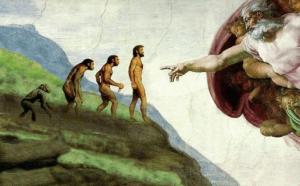The ridiculous contention between science and religion.
We believe from compelling evidence that prayer works. There are things we can’t explain by science. But does God exist only where science doesn’t have an answer? When science learns more, does God disappear? Theologian Dietrich Bonhoeffer, who was martyred by the Nazis, said, “We are to find God in what we know, not in what we don’t know.”

What we know is, while things we can’t explain happen, we actually find God in our daily life as the result of the effects of allowing love to work within us and others. This results in the transformation of people. The intervention by God in nature is rare and has always been considered rare. But answered prayer has always been the realized expectation.
So why the collision of science and religion?
We’re our own worst enemy when it comes to faith. It’s very hard for many to accept that there is anything beyond the world that can be seen. We don’t live in the ancient world in which myths were easy to believe and people dug up dead relatives and drove stakes through their vampire hearts. We live in a world where science and philosophy say, “Not so fast! Let’s look at that and subject it to scientific scrutiny.”
Some in science have the attitude that if they can’t sense it, measure it, repeat it, then it doesn’t exist. This means they can’t accept any evidence beyond the microscope, and aren’t looking.
It isn’t just science – we are often the same
Can we count on prayer, and can it be subjected to scientific studies, truth, and experiences?
Does science even apply? Religion and science are two very different fields. Science is involved with investigating and harnessing the physical world to improve our lives. Religion helps us understand how to live with and treat each other. Science examines and guides the material world. Religion examines and guides the moral and ethical world. It isn’t up to one to negate the other. But people try. They use philosophy and science to try and undo people’s belief in God.
Studies on prayer
The National Institutes of Health (US Government) collects scientific studies on prayer. The studies are conflicting. Why? It may be the nature of studies. Science is very demanding. Medical studies are done by very strict standards and are usually very reliable. The FDA and doctors always probe for problems to make sure they stay that way.
It’s easy to skew a study. If the research doesn’t involve enough people or the researcher selects the wrong end point, the results can errantly point to the researchers’ personal views. In medicine, many doctors who aren’t early adopters (quick to try new things), will wait for the medication to be used for years before they try it, because they know studies may not tell all there is to know about long-term effects. The larger and longer the trial, the more risks and individual differences show up. This guides prescribing medications to risk groups.
In contrast to prayer expectations, how reliable is science?
Interestingly in the soft sciences like psychology and economics, where perceived methodological rigor, exactitude, and objectivity are considered less, around 50% of studies of psychology and 30% in economics can’t be replicated with the same result.
For example in psychology, a ready supply of students are often used in experiments and the results can be very different for older people. And in economics, start and end points are often fudged to give the researcher the result they want. Results like these are now considered a replication crisis in science research.
Even the hard sciences like physics admit exceptions, which are considered further areas for research. Yet somehow studies in both soft and hard science still have overall credibility.
Difficulty designing studies on prayer
I think designing studies to assess the effectiveness of prayer is more difficult than people assume. For example, are those elderly who have reached the end of their life and are dying, going to be cured by prayer? I have doubts about most of them. Should I have gone ahead and spent twelve years to become a psychiatrist, supported by other’s prayers, just to find out I chose the wrong profession? That’s a lot of time invested in the wrong profession.
A hypertension study asks if interventional prayer can lower blood pressure. That kind of means, does God grant prayer requests to remove plaque buildup in arteries? I would suggest that usually mountains remain unmoved, but I can’t argue that in total confidence – the heart has several pathways for blood pressure control. What is the specific pathway being assessed?
My wife’s father prayed to live to see her through high school. He had several heart attacks, and had one while being monitored in a hospital. The clot created a new hole through the plaque that allowed him to continue living. That’s got to be close to a miracle. Never say never. Just say, “Improbable, but we can try.”
Subtle influences on the body
We know the mind has an influence on the body’s health. An article in Health.com, Can Negative Thinking Make You Sick? Stated, “Take cynicism, for example: A 2014 study published in the journal Neurology linked high levels of cynicism later in life, i.e. a general distrust of people (and their motives), to a greater risk of dementia compared to those who were more trusting, even after accounting for other risk factors like age, sex, certain heart health markers, smoking status, and more.” And, “the most cynical participants were more likely to have heart disease than the least cynical folks. The more pessimistic women also had a higher chance of dying over the study period, versus those who were more optimistic about humanity.”
An 80-year Harvard study found a major influence on our health is our state of mind. Their article, Good genes are nice, but joy is better, tells about it.
We’re beginning to understand the more subtle influences on our health. Perhaps instead of designing studies about moving mountains, we need to examine more subtle pathways when designing experiments about the effectiveness of prayer. After all, God speaks to us through a still, small voice, not through thunder.
The Institute of Noetic Sciences (IONS), formed by former astronaut Edgar Mitchell, explores the more subtle influences in measurable ways, with rigid scientific controls. Between this and scientific research into quantum mechanics, perhaps science will begin to understand more about how subtle things work at least in effect if not in identifying the hidden mechanisms.
The power of prayer
God guides us, but it’s our choice how we respond to make a difference. The world’s hills, if not mountains, are moved by our hands, inspired by our faith in God. Pray, have faith, but expect the best and prepare for the worst.
Take Home Points
Many scientists are religious, but many criticize religion. Scientific studies allow for exceptions, and in the soft sciences of psychology and economics, they aren’t all that reliable.
The world’s hills, if not mountains, are moved by our hands, inspired by our faith in God.
Pray and keep communicating with God. It works.
Series Links
Some think they deserve to suffer and die
Is prayer a conveyor belt of miracles?
Is the action of God in the universe responsible for much?
Criticism of studies on prayer, and of science
Science and philosophy have their own standard: 100%
Our answer is God. God’s answer is us. Together we make the world a better place.
– Dorian
Other Patheos writers on prayer


















